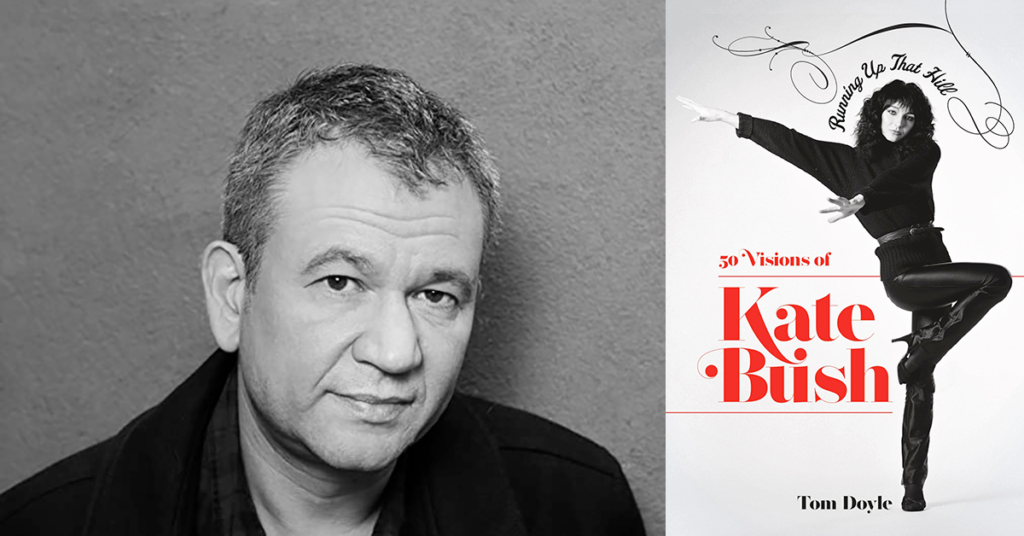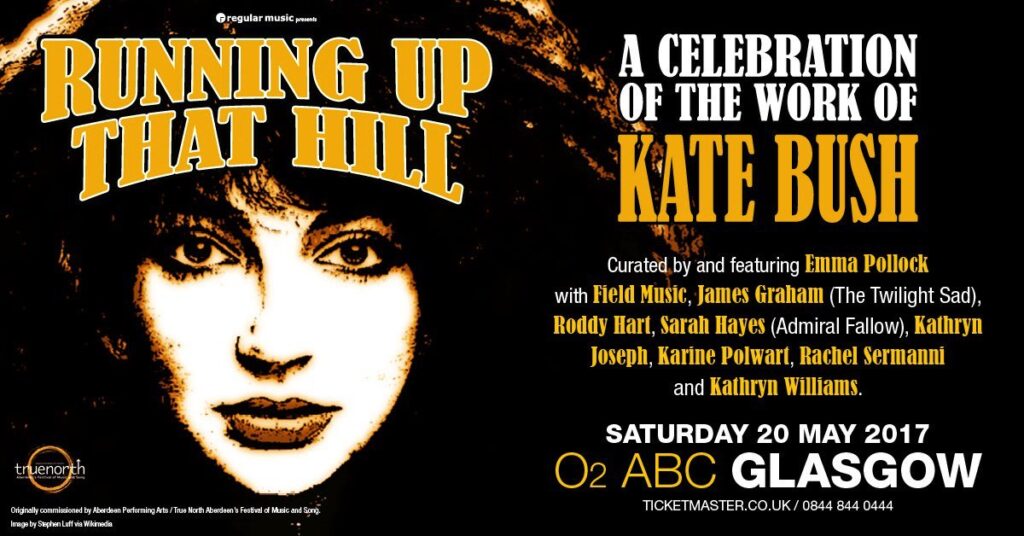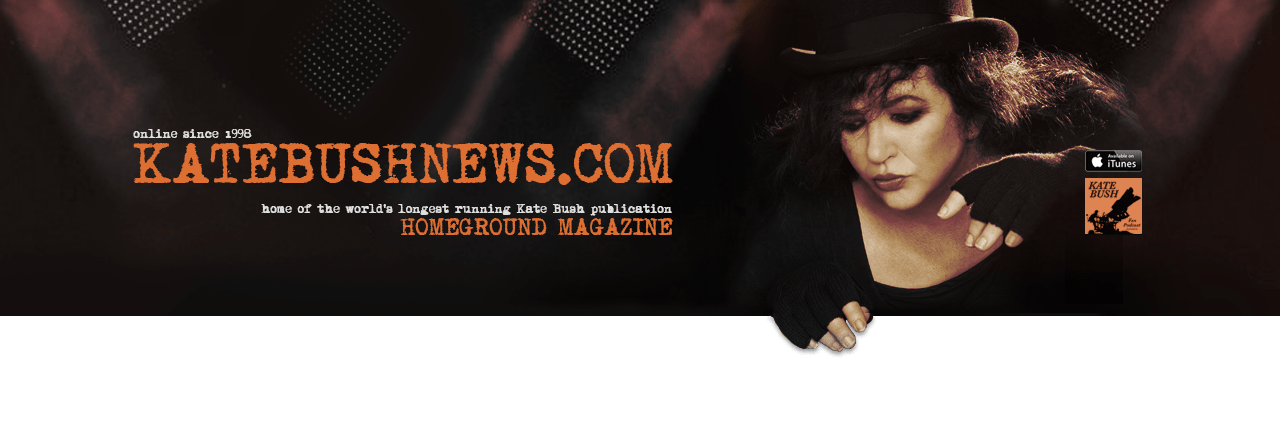
Thanks to everyone who entered our Running Up That Hill: 50 Visions of Kate Bush book giveaway competition, we had hundreds of entries and the successful winner has been notified! As a thank you for your interest in the book (see our enthusiastic review here) the author, Tom Doyle, has decided to exclusively share an unpublished chapter (or “vision”) from the book. You can DOWNLOAD the chapter here (PDF format) or read it in full below. The book is published today and has already received glowing reviews from the likes of Mojo Magazine (4/5), Record Collector (4/5) and Uncut Magazine (9/10). Tom writes:
Hello folks,
So, my Kate book is out today. It was very much a labour of love for me, and quite some trip to write. I’ve never laughed or “twinkled” as often as I did when writing this book, so I very much hope you enjoy.
There was one “lost” chapter that ended up on the cutting-room floor. So, here it is as an exclusive for Kate Bush News.
Cheers,
Tom
Order “Running Up That Hill – 50 Visions of Kate Bush” on Amazon UK
A Celebration
Staging Kate Bush Tribute Shows, 2016-17
In the 1980s, for a generation of future musicians, Kate Bush’s 1986 hits collection, The Whole Story, was their portal into the world of her songs. Scottish singer Emma Pollock – of Glasgow indie rock band The Delgados, and a solo artist in her own right – was 15 years old when Bush’s singles collection was released. It made a huge impression on her.
‘It goes back to my mum introducing me to Kate Bush’s music in the late ‘70s,’ she says. ‘She adored “Wuthering Heights”. But I bought The Whole Story with my own Christmas money, and I just had an absolute love affair with that album.
‘For kids, compilations are amazing, because they provide a point of access, and you don’t have to grapple with the artist’s song choices when it comes to an album, and how they might be slightly difficult for a kid. I think compilations hit the sweet spot for someone who suspects they’re a fan but kind of needs it confirmed.’
Similarly, in Sunderland, brothers Peter and David Brewis, later to combine their vocal and multi-instrumentalist talents in their art rock band Field Music, were surrounded by Kate Bush’s songs at home when they were kids.
‘I was only six or seven,’ says David. ‘But I intrinsically knew all of the songs on The Whole Story. And I probably knew all the songs on the first side of Hounds of Love. But I don’t think you understand the second side until you’ve passed eight years old (laughs).’
‘Growing up, Kate Bush was just part of the musical fabric of the household,’ says Peter, by four years the elder brother. ‘Those records were just around all the time. And they definitely became part of my idea about what music is meant to be. It’s the idea of this synthesis of various things to create your own music.’

In 2016, Emma Pollock was approached by the organisers of the True North music festival in Aberdeen with the idea of her staging a show involving a line-up of guest singers exploring the music of Joni Mitchell. ‘Even though I love Joni Mitchell, I actually wanted to do Kate Bush,’ she says. ‘So, I kind of countered with that. And they said, ‘Yeah, sounds great.’”
But it immediately became clear to Pollock that organising what was to become Running Up That Hill – A Celebration of the Work of Kate Bush was an enormously daunting task.
‘Oh yeah,’ she laughs. ‘I went through the entire discography to try and work out where I thought the highlights were. Because there’s the obvious highlights, but you could also stray into non-single material, which is where things get really interesting. That’s where artists excel in many ways. I eventually pulled together something like a 20-song wish list and I listened to them in a brand new way and got to know them back to front, sideways, upside down…’
Significantly, on the list were a number of selections that Bush herself had never performed live: ‘Sat in Your Lap’, ‘The Big Sky’, ‘Suspended in Gaffa’ and ‘Love and Anger’ among them. So, for Pollock, there was no way of referencing how the songs had previously been transferred from studio to stage.
‘That was one of the reasons why I actually thought that Kate Bush was at once a mad choice, but also an obvious choice,’ she says. ‘Because we, as her audience, had never had the opportunity to experience these songs in a live sense. So, even though it was maybe quite a bold thing to say, “OK, well, we’ll do them then”, it actually became an exercise in trying to respect the recordings.’
The initial challenge was to pull together a band who could arrange these often rhythmically and melodically complex tracks into performance-worthy shapes. Pollock employed the services of drummer Philip Hague and keyboard-player Sarah Hayes (both of Scottish band Admiral Fallow), bassist Graham Smiley (Arab Strap), guitarist David McAulay (King Creosote), jazz pianist Tom Gibbs, and a string quartet.
‘They’re all absolutely brilliant musicians,’ Pollock enthuses. ‘We also managed to find some amazing Fairlight samples to help us create this world. It sounds perhaps very practical, but I actually think that, in that accuracy, we were trying to embody Kate’s vision, which had remained in the studio, and we wanted to bring it to the stage.’
Meanwhile, the singers who chose to accept the challenges of performing Bush’s songs included figures from the worlds of indie and folk: Kathryn Joseph, James Graham (The Twilight Sad), Karine Polwart (multi-winner of BBC Folk Awards), Kathryn Williams and Rachel Sermanni.
What would turn out to be the first of two Running Up That Hill celebrations was held on 25 September 2016 at His Majesty’s Theatre, Aberdeen. ‘I opened the show with “The Man With the Child in His Eyes”,’ says Pollock. ‘For me, it’s one of the most perfect moments in pop melancholia, if you like. It just has that beautiful stillness.’
Both Peter and David Brewis had been invited to get involved, though (due to being on paternity leave) the latter couldn’t make it. And so Peter Brewis alone bravely tackled the complexities of ‘Sat in Your Lap’ that night, albeit with the backing vocal support of duo Bdy_Prts (Jill O’Sullivan and Jenny Reeve). ‘I thought, How do I approach something like “Sat in Your Lap?”’ he recalls. ‘I wasn’t trying to be Kate Bush. So, I thought, I’ll just do my own voice, but kind of like I’m in a New Wave band.’
The artists’ personal interpretations were sometimes the keys to unlocking the songs. In ‘Breathing’, Karine Polwart replaced the chilling mid-song mushroom cloud radio report in Bush’s recorded version with her reading quotes from the 1979 Protect and Survive Home Office Advice to Householders pamphlet. In Polwart’s powerful monologue, she viewed the ludicrous government advice on how to survive a nuclear attack from her own perspective as a nine-year-old in the Central Scottish village of Banknock, faced with the prospect of hiding in a cupboard with ‘digestives biscuits, dog biscuits, bin bags and blankets… Sellotape and a six-month stash of the Sunday Mail’.
‘Karine brought something of her own childhood to it,’ says Pollock. ‘She referenced her own impressions of the threat of nuclear war, and it was absolutely mesmerising.’
The second and final performance of the Running Up That Hill celebration was staged eight months later, on 20 May 2017, at the O2 ABC in Glasgow (a venue tragically destroyed the following summer by the same fire that gutted the adjacent School of Art).
Both of the Field Music brothers were available that evening. Together they reprised ‘Sat in Your Lap’, and successfully navigated their way through ‘All We Ever Look For’ and ‘Rubberband Girl’. Peter sang delicate Hounds of Love ballad ‘Mother Stands for Comfort’, and David pushed his range to deliver ‘Babooshka’.
David: ‘I mean, if I’m warmed up, I’ve got a pretty big range. But I was really stretching for that stuff.’
Peter: ‘But you hammed it up as well.’
David: ‘No, I didn’t!’
Peter: ‘You did!’
David: ‘You’ve got to embrace it. It’s a story. It’s from the era of her music that was quite overblown and pushing from drama into melodrama. And I don’t think she would have seen it as camp. But it’s going in that direction.’
All of the male contributions to the show (including Roddy Hart’s ‘Army Dreamers’ and ‘Hounds of Love’, and James Graham’s ‘Running Up That Hill’) reinforced the fact that Kate Bush rarely wrote or sang her songs from a female perspective.
‘Even her songs that are sung first person,’ David Brewis points out, ‘you don’t assume they are about her. They’re narrative scenarios. So, something like “Babooshka”, that’s not at all odd to sing as a man, because you’re just telling the story.’
‘Gender never really even occurred to me with this catalogue,’ says Emma Pollock. ‘It’s a funny one. I know that in a way, Kate Bush is clearly this very feminine presence. But in the music itself, I actually think that she’s wholly androgynous and just occupies a space which is just uniquely her own.’
Unsurprisingly, though, none of the guys involved in the production volunteered to sing ‘Wuthering Heights’.
‘I think a lot of us girls were running scared of that song,’ Pollock laughs. ‘But we knew that it wouldn’t necessarily fly to not include it. Y’know, because at the end of the day, this was a celebration of Kate Bush. How can you do that without a nod to this ridiculously successful entry that she made into our popular culture? And one that she did sort of defiantly, because she was so adamant that this would be her first single.’
In the end, for the evening’s closing encore, Rachel Sermanni sang ‘Wuthering Heights’. Perhaps fittingly, only 25 at the time, she was the youngest performer in the show. ‘She was magnificent,’ says Pollock.
After the gig, Pollock was approached by a Kate Bush fan who’d attended one of the Before the Dawn shows three years earlier. During those London performances, the Eventim Apollo crowd had been showered with thousands of mock-parchment copies of the Tennyson quote from ‘The Coming of Arthur’, which had featured on the back of Hounds of Love. To show their appreciation for this Kate Bush tribute, the fan wanted to give their memento to Pollock.
‘I was absolutely relieved that, before the show, I hadn’t known that this person had been to the Kate Bush show,’ she laughs. ‘I wouldn’t really have wanted to know that anyone had such a recent reference point to the real artist.’
Ahead of staging the first performance, Pollock had actually tried to send a message to Kate Bush’s manager David Munns, as a courtesy, to let him and the singer know that it was happening. ‘We didn’t get any response at all,’ she says. ‘I get the impression that maybe it didn’t reach them. Or maybe they felt there was no need to reply.’
Still, for its organiser, Running Up That Hill: A Celebration of the Work of Kate Bush was an entirely satisfying creative experience.
‘It was so much fun,’ Emma Pollock concludes. ‘You can climb inside these songs and just spend days marvelling at them.’

Leave a Reply